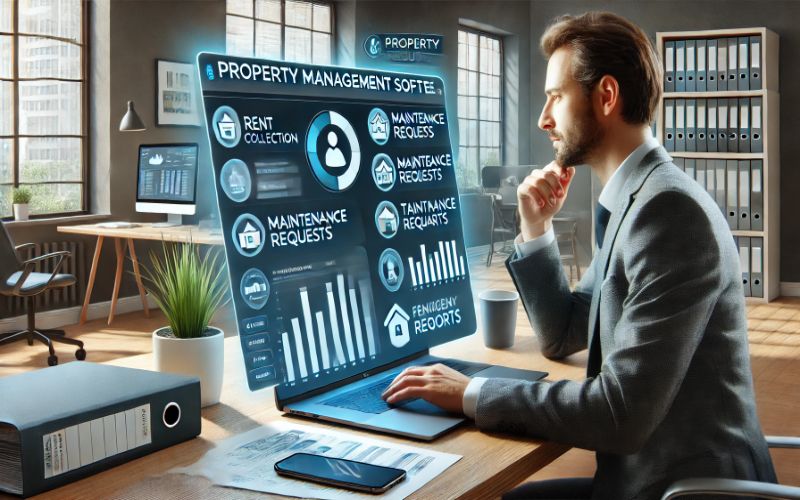Oct 7
Effective Tips for Managing Rental Properties Successfully
Managing rental properties can be both rewarding and challenging—an intricate balancing act between maintaining the physical asset, adhering to laws, and fostering good tenant relationships. If you're a real estate investor looking to optimize your rental properties, mastering these skills will help you transform your property into a steady source of income while minimizing the headaches along the way.
In this guide, we will share essential tips and strategies for effective rental property management that will keep your investments profitable, tenants happy, and operations running smoothly.
Tips To Mastering Your Role As A Rental Property Manager
Managing rental properties goes beyond simply collecting rent. It requires a well-rounded approach, from marketing and tenant screening to maintenance and legal compliance. As a landlord, your goal is to create a harmonious environment where tenants are satisfied and properties remain well-maintained. Strategic planning usually dictates the outcome of a rental management endeavor since everything, from leasing to housekeeping, has been designed into every detail.
Here are some actionable tips that can help you thrive as a property manager:
Set Clear Expectations from Day One
Successful rental management starts with setting clear expectations and boundaries. A well-drafted lease agreement serves as your blueprint, covering everything from rent schedules to maintenance responsibilities.
- Create a Comprehensive Lease: A solid lease agreement should outline payment terms, maintenance duties, and policies regarding pets, utilities, and repairs.
- Communicate Responsibilities: Be transparent with tenants about who handles what—whether it's lawn care or utility payments. This minimizes confusion and builds a foundation of trust.
Stay on Top of Legal Compliance
Laws around rental properties can be complex and vary widely by region. From safety standards to tenant rights, staying compliant with local, state, and federal laws is essential to strategic management.
- Know Your Regulations: Educate yourself on relevant laws, including eviction procedures, rent control, and anti-discrimination policies.
- Avoid Legal Pitfalls: Failing to comply with legal standards can lead to costly fines or lawsuits. If you own properties across multiple jurisdictions, ensure you’re well-versed in the regulations of each area.
Screen and Lease Like a Pro
Selecting the right tenant is a game-changer. A solid tenant can make your property management experience smooth and profitable, while a problematic one can cost you time and money.
Develop a Rigorous Screening Process
A tenant screening process will find you fewer problems later on. You want to find tenants who are sound financially, responsible, and likely to stay for a long term. These are the essential steps in tenant screening:
- Credit Check: You must look for tenants with a good credit history. That will give you insight into whether they can manage financial obligations, which good, timely rent payments can follow.
- Background Check: Past criminal records and evictions will automatically raise red flags at this point regarding problems that may occur later.
- Verification of Employment and Income: This is to ensure that the tenant earns a decent, stable income. The Professional tenant's average income should be at least three times the monthly rent.
- References: Confirm with previous landlords to know their rental history and behavior.
Create a Well-Drafted Lease Agreement
Once you find a good tenant, prepare a detailed lease agreement. Your lease must specify details like dates of rent collections, what you charge for late fees, maintenance policies, security deposits, and so on. Other house rules about your property, such as pet policies or no-smoking areas, should be included. It's always a good idea to send your lease through a lawyer for proof that you haven't missed any loopholes in your local compliance.
Make Rent Collection Easy and Efficient
Maybe one of the most critical acts of managing your rental properties revolves around ensuring you have an efficient mechanism for collecting rent and managing finances. Late payments might be bad for cash flow, and poor record-keeping results in tax issues or stress.
Automation of Rent Collection
Automated rent collections would probably be the most efficient and reliable way to ensure timely collections. That can become possible through the use of online portals and property management software, which will enable tenants to make their rent payments online; while being lenient on both sides by automatically reminding them of approaching deadlines for rent payments so that there will be no late payments.
Expense and Income Tracking
Accounting is much more than just a collection of rent. Keep track of all the expenses associated with the property:
- Maintenance
- Taxes
- Insurance
Accounting software makes recording income and expenses easy and allows you to create reports, which might even help prepare your income tax return.
Security Deposits Management
Security deposits are part of the management of rental properties and are a kind of security against damages or non-payment of rent, for example. However, they do need to be handled correctly to prevent the occurrence of legal hassles. Make sure you know what's allowed, where to keep the deposit, and how it will be returned at the end of the lease in your area.
Prioritize Maintenance and Repairs
Always take good care of your rental property since this is how it retains its value and attracts the best quality tenant. Maintenance also protects you from particular small problems from becoming substantial expensive issues and help you in your property development practice.
Schedule Preventive Maintenance
Preventive maintenance helps to keep your property in optimal shape. Establish a maintenance schedule for HVAC checks, plumbing inspection, and the inspection of the roof. This enables your features on the property to last much longer and you avoid inconvenient repairs which might upset the lives of the tenants.
Respond to Repair Requests Quickly
Tenants will always expect their landlords to respond to their maintenance needs within the required time. Create an application where it becomes easy for tenants to report any maintenance issues. You will respond immediately on your relationship with the tenants and avoid further damage if you compile your trusted contacts who could quickly provide an immediate response for the repairs.
Budget for Upgrades
Put aside some of the rental income to face any such eventualities and periodically upgrade the property for it to remain attractive. The upgrade can be as minor as changing the kitchen appliances or refreshing the paint because a professional tenant will easily attract a person who understands what is needed.
Foster Positive Tenant Relationships
Good communication and a respectful relationship strategy with your tenants can lead to long-term leases and a more pleasant management experience. Building these relationships requires consistent communication and mutual respect.

Encourage Open Communication
Communication is the most important aspect of interacting with the tenants in a positive way. Let your tenants reach you easily when they have any questions or complaints. Use communication tools like email, messaging apps, or a dedicated property management portal to make it easy for them to ask questions. Being friendly and approachable would help you and your tenants build trust, thus taking good care of the property.
Address Tenant Concerns Proactively
Nothing goes well for long and there would be conflicts or concerns arising. Tackle them promptly and professionally. It might be noise complaint, the maintenance issue, or a question about the lease. Pro-actively managing would ensure these issues do not turn into something more harmful.
Offer Incentives for Long-Term Leases
One of the most aggravating headaches for landlords is the cost associated with tenant turnover. Rental income often stops once the tenant moves out, and the marketing and preparation costs for finding a new tenant accumulate quickly. Helping alleviate some of the pain of turnover can include offering incentives for long-term tenancy: minor rent reductions for renewal lease agreements, upgrades on appliances, and flexible options on lease terms.
How to Navigate Common Property Management Challenges
Even the most diligent landlords find themselves facing some difficulties at times. Being more prepared shall enable you to sidestep over such snags more efficiently while dealing with problematic tenants or managing properties.
Here’s how to address some of the most common hurdles:
Managing Difficult Tenants
Problematic tenants can make managing your property feel like a nightmare. Whether they’re paying late or breaking rules, these situations require a firm yet professional approach.
- Stick to the Lease: When issues arise, refer back to the lease agreement. Clear documentation helps settle disputes.
- Use Mediation: If the situation escalates, consider mediation before jumping to eviction.
- Know When to Pursue Legal Action: In extreme cases, legal action might be necessary. Always follow the legal eviction process carefully to avoid repercussions.
Managing Multiple Properties
Managing multiple rental properties requires even more organization and attention to detail. If you struggle to keep up, consider hiring a property manager or using property management software that can help you track maintenance requests, rent payments, and tenant communications across all your properties. Delegating some responsibilities can free up your time and allow you to focus on business development strategic activities to grow your real estate portfolio.
How Property Management Software Can Benefit You
If you're ready to elevate your property management game, then property management software is your secret weapon. This type of software is one of the best ways to streamline property management. These platforms offer tools to help with everything from tenant screening and lease signing to rent collection and maintenance tracking.

How Property Management Software Is A Game Changer
With property management software, you can save time and stay organized. Many platforms let you automate rent collection, handle maintenance requests, and communicate with tenants all in one place. This can be a huge help, especially if you're juggling multiple properties or have a busy schedule. Some software even comes with accounting features, so you can track expenses and income effortlessly.
How to Choose the Right Software
With so many powerful options available, it’s crucial to find a platform that aligns with your specific needs. Consider factors like cost, features, and ease of use. Industry favorites like Buildium, AppFolio, and TenantCloud offer tailored solutions for different portfolio sizes and management styles. So, take your time, explore your options, and choose the software that will propel your property management business forward.
Elevate Your Property Management Game with Strategic Planning
Successfully managing rental properties is no small feat, but with the right approach, you can transform it into a rewarding venture. By implementing strategic planning and the actionable tips from this guide, you’ll not only streamline operations but also create lasting relationships with tenants and maximize your investment returns.
From staying legally compliant to embracing property management software, each step you take builds a stronger foundation for your property management journey. Whether you're managing a single unit or a growing portfolio, proactive strategies are key to thriving in this industry. With effective tools, clear communication, and a commitment to excellence, you’re well on your way to achieving long-term success in rental property management.
COACHING
Service is at the heart of everything we do at Strategic Success Consulting. You'll experience the difference when you talk to our associates, and you'll see the difference that exceptional makes in your learning journey. Book a Discovery Call for more information!
COURSES
We offer Strategies, Courses, Modules and Deep Dives to help support you throughout your business or real estate investing journey.
EVENTS
Come check out our Strategic Entrepreneur Networking events in person or online! We also host webinars, workshops and other events that you can find on our events calendar!
ABOUT US
At Strategic Success Consulting we uphold an ongoing commitment to providing an elevated level of personal service. Our clients come first, and as a result, they are able to achieve more than they ever dreamed with their business and/or real estate investing.
Copyright © 2024 Strategic Success Consulting Inc. All rights reserved.
